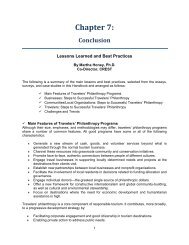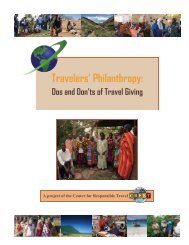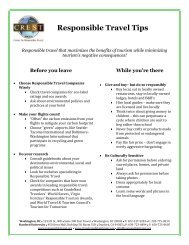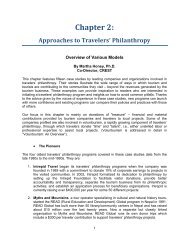Travelers' Philanthropy Handbook - Center for Responsible Travel
Travelers' Philanthropy Handbook - Center for Responsible Travel
Travelers' Philanthropy Handbook - Center for Responsible Travel
You also want an ePaper? Increase the reach of your titles
YUMPU automatically turns print PDFs into web optimized ePapers that Google loves.
3. For Those Considering Voluntourism, Understand the Complexities and the Prosand Consa. Volunteering can be a deeply inspirational and educational experience <strong>for</strong> thevolunteer – often more personally satisfying than giving material or financialdonations.b. Be honest with yourself about your motives and how much tourism and how muchvolunteering you want to do.c. Carefully assess whether the living and working conditions are acceptable.d. Determine what you like to do and what skills you can offer.e. Determine how much money you can spend on a voluntourism trip.f. Consider any potential negative consequences of a volunteer project. For example,is the time you can commit sufficient to be beneficial to the host organization? Wouldyou be doing work that could be done by employing locals? Might it risk creating aculture of dependency on outsiders?g. Consider if you might be able to raise the money to pay a local resident to do thework you were planning to do <strong>for</strong> freeh. Make arrangements through a well-established and experienced tourism company orvolunteer organization.i. Thoroughly check out the credentials of the local organization, including contactingpast volunteers and organizations specializing in placing volunteers.j. Be prepared to make a commitment as a longer term supporter of the organization orproject. This includes teaching others in your home community about theorganization and providing ongoing contributions personally and/or from yournetwork of family, friends, and colleagues to support its work. Challenges and Trends in <strong>Travel</strong>ers’ <strong>Philanthropy</strong>Over the last two decades, the principles and good practices of ecotourism, which werepioneered primarily by small lodges scattered around the globe, have been adapted andincorporated into the operations of larger hotels, resorts, international tour operators, restaurantchains, transport companies, and other sectors of the mainstream tourism industry. Similarly,travelers’ philanthropy began through scattered and isolated experiments by owners andmanagers of tourism businesses – the proverbial Good Samaritans – who had an ear to theground and responded to local needs and requests <strong>for</strong> help. Today, travelers’ philanthropy hasbeen embraced by many larger businesses and is widely recognized as a core component ofcorporate social responsibility and responsible travel. Increasingly, bilateral and internationaldevelopment agencies, including USAID, the Inter-American Development Bank, and the WorldBank, are viewing travelers’ philanthropy as a component of tourism-based poverty alleviationand rural development work.One challenge, however, is how to keep travelers’ philanthropy grounded in supporting localcommunity and conservation needs in the far flung destinations around the globe, rather thansimply becoming a funnel <strong>for</strong> loose change from travelers into the large traditional charities likethe Red Cross. Not that these multi-national charities aren’t deserving, but they have developedenormous capacities <strong>for</strong> raising funds. By its very nature, tourism has a unique opportunity andcapacity to raise funds <strong>for</strong> pressing needs in those beautiful, vulnerable, marginalized, and often<strong>for</strong>gotten places on earth.As travelers’ philanthropy grows and matures, another challenge is how to deepen, enrich, and215















